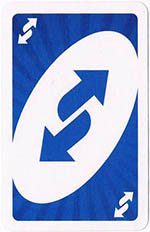Not infrequently, I would wait until he was out of the room to get a snack or whatever and stack the Uno deck. For those unfamiliar with the game Uno, there are a number of "special" cards that can help you (or hinder your opponent). These special cards include:
Standard Special Cards

Draw 2 Card
The next player must draw 2 cards and forfeit the turn.

Reverse Card
The direction of play is reversed.

Skip Card
The player is skipped (loses their turn).Wild Card
Change the color being played to any color (provided "any" color is blue, red, green, or yellow).

Wild Draw 4 Card
Choose the next color played and force the next player to pick 4 cards and forfeit his/her turn.
What I would do is take all these special cards and, because there were only two of us playing, I would insert a special card with every other card. So, he gets a regular color/number, I get a special card. He gets a boring normal card, I get a special card. It took him a few rounds to figure out what I was doing. I mean, what are the odds that I would get all 4 Wild Draw 4 cards every round, round after round?!?
This, of course, reminds me of the threats the democrats are throwing around about stacking the court (in this case, the SCOTUS). If you'll recall, ruling octogenarian Ruth Ginsburg passed away recently leaving a vacancy on the SCOTUS bench.
The democrats immediately started screaming that the Republicans don't have the right to fill the slot until after the election (oh, and by the way, 2020 is an election year - meaning that we're voting for POTUS this November).
The process by which the POTUS selects a person to fill a SCOTUS is difficult to follow - if you don't have a reference point. Thankfully, there are number of resources to pull from including the report from Congressional Research Service (CRS): Supreme Court Appointment Process: President’s Selection of a Nominee.
According to Article 2, section 2, Clause 2 of the United States Constitution: The “Appointments Clause” states that the President “shall
nominate, and by and with the Advice and Consent of the Senate, shall appoint ... Judges of the
supreme Court.”
So, in a nutshell, when there is a vacancy, the POTUS can nominate someone for the Senate to vote on the appointment of a person to fill a SCOTUS vacancy. Nothing in the Constitution says when all this may occur - just that it can.
So, what does this all have to do with stacking the court? Ever hear of Rodrigo de Borja? Rodrigo was elected Pope of the Roman Catholic Church and served from August 1492 until his death in 1503.
Before Rodrigo became Pope, the number of Cardinals in the College of Cardinals (the chief ecclesiastical body of the Roman Catholic Church tasked with electing and advising the pope) was anywhere between 14 and 29 (depending on who you talk to).
During the time Rodrigo ruled as Pope Alexander VI, he stacked the College of the Cardinals by increasing the number to 43 (and, as it turns out they were all related to Rodrigo). This effectively ensured that every decision by Rodrigo was supported by the full faith and credit of the College of Cardinals.
Imagine - every decision never questioned. More taxes? Granted. More parties? Granted. More largess? Whatever you want, Rodrio. What ever you want!
Again I ask: what does this all have to do with stacking the court? Imagine if one political body (in this case, the democrats OR Republicans) could pack the SCOTUS with another 9 judges (so, 18 in all) that all believed the way the present ruling political body believed; What would happen? The ruling political body would get everything they wanted and no one could stop them.
So, the body that creates the laws would also control the body that rules on the laws. Forget about the craziness of it all - talk about a blurring of lines!
Few things are more predictable than incumbent members of the U.S. House of Representatives winning reelection. With wide name recognition, and usually an insurmountable advantage in campaign cash, House incumbents typically have little trouble holding onto their seats. While Senate races still overwhelmingly favor the incumbent, re-election is not as assured as House races.
So, picture it. You have entrenched members of the house who have been in power for decades. Now, add another 9 judges to the SCOTUS in step with their ideologies. With control of legislative branch, the executive branch, and a stacked judicial branch, they could do whatever they wanted for as long as they wanted to do it (or as long as they can get the American people to believe the lie that 'we the people' are in control).
It sounds crazy but have you been listening to some of these politicians lately?
Crazy as loons, they are (and crazy enough to try to pull it off).


No comments:
Post a Comment